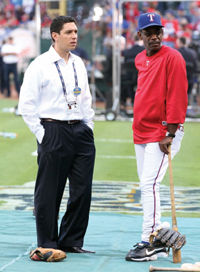While Daniels represents the new breed of stat-savvy GMs, he insists that numbers are "second to the human element," and that old-school baseball acumen is still vital. "All information is good information," he says, "but when it comes down to it, if I had to pick one or the other, I'd defer to our scouts." Every roster decision is the product of player evaluation, and as the man essentially in charge of player acquisition for the Rangers, Preller oversees roughly forty-five amateur, professional, and international scouts. "You can't be everywhere at once," he says. But apparently he tries, traveling constantly—from Sarasota to Santo Domingo to Seoul. He has amassed nearly two million frequent flyer miles, often averaging several flights per day. Although he has an apartment in Dallas, during the first four months of 2011 Preller (who is single) spent a total of four nights there.
Preller describes scouting as 'looking at a fifteen-year-old kid who has never played organized baseball and trying to determine if he has a chance to play in the big leagues someday.'Under his guidance, the Rangers have quadrupled their international scouting budget, even opening a baseball academy in the Dominican Republic. "My whole life, I've loved the international aspect of the game," says Preller, who wrote an undergraduate term paper about baseball in Latin America. He describes the scouting experience as "standing on a field in Venezuela, looking at a fifteen-year-old kid who has never played organized baseball, and trying to determine if he has a chance to play in the big leagues someday."
Daniels relies heavily on scouts, his philosophy being that he knows his own limitations—and his employees' strengths. Last October he invited about a hundred people on his acquisition and player development staff to Arlington to be honored on the field before the first home playoff game. "You have to hire good people and let them do their jobs," he says. "A. J. is a perfect example of that. I think he's the best in the business at what he does."

One of Preller's top finds came from overseas. Pitcher Colby Lewis was selected by the Rangers in the first round of the 1999 amateur draft, but he struggled early in his career. By 2009, he was pitching in Japan. Having beefed up the team's Pacific Rim scouting operation, Preller heard that Lewis had vastly improved, so he and two colleagues went to Hiroshima to judge for themselves. "We've found players a lot of different ways, trying to think outside the box," says Preller. "But to go to Japan and bring back an American guy who hadn't had much success over here really wasn't what teams were doing." But Preller had faith in his scouts, and Daniels trusted Preller's judgment. Lewis played his way into the Texas starting rotation last year; in the playoffs he went 3-0, including a masterful performance during the final game against the Yankees, a team whose payroll cost nearly four times as much as the Rangers'.
The team's international expansion has been part of a general improvement in its player development program. In 2010, Baseball America ranked the Rangers' minor league system fourth overall; 20 percent of the big league team's playoff roster consisted of players drafted and developed within the previous five years. As a result, Preller has drawn attention as a GM prospect himself. "If there's a Jon Daniels, Part II, this is it," Baseball Prospectus declared midway through last season. "The Rangers' success has been fueled in large part by players that Preller has his fingerprints on."
Last year, the pieces of the puzzle were coming together by midsummer, and the Rangers were in first place. But when the mid-season trade deadline arrived in July, Texas had a choice: try to coast to the postseason, or refuel. Daniels chose the latter in a big way, acquiring clutch pitcher Cliff Lee from the Seattle Mariners in a six-player trade.
The move established Lee as the ace on a pitching staff that had changed so much over the summer that the season's first three starters didn't even make the playoff roster. In 2005, when Daniels took over, Texas pitchers had allowed nearly five runs per game; in 2010, they allowed fewer than four. Texas won ninety games and the A. L. West division title. And during the playoffs, Lee emerged as one of the best postseason pitchers of all time. (In the off-season, Lee rejoined the Philadelphia Phillies in a much-ballyhooed free-agent deal.)

Game 5 of the first round of the playoffs against the Tampa Bay Rays was, at the time, the most significant game in Rangers history. Several hours before the first pitch, Daniels called his assistants to a meeting at their St. Petersburg hotel. They arrived to find him wearing a fake mustache and sitting in a rocking chair; he announced that he was treating them to a couple of rounds of miniature golf. "At that point, we'd done everything we could," Daniels explains. "We were just spectators."
A sense of humor is a must in a job where turnover is so high that the thirty-three-year-old Daniels is now the eighth-longest-tenured GM in the major leagues. He has learned to ignore the ever-opinionated media and blogosphere, which may be the most difficult part of a public role in the sports industry. "It's hard to be fully prepared for it, but it's very much part of the game, the business, and the position," says Daniels, who signed a four-year contract extension in March. "The team is somewhat of a public trust, and we're stewards of it."
As it turned out, a near-perfect script unfolded during the rest of the American League playoffs. The Rangers beat the Rays, then knocked off the Yankees. When the last out was called, and the team was World Series-bound, Daniels and Preller joined in a heart-felt group hug in an executive suite. "We had some struggles early," Preller says. "But in that moment, just seeing the joy of everyone in the State of Texas, and being able to do it with a guy I grew up with and had a lot of good times with, that made it all the better."
Of course, they would have preferred an even happier ending—one in which the Rangers, rather than the San Francisco Giants, won the world championship four games to one. "Hopefully this is just the beginning," Daniels said upon accepting Baseball America's Executive of the Year award a few weeks later. "Now we've got to find a way to get a little better, to get back there next year and win those last three games."
Brad Herzog '90 is a CAM contributing editor. His first published story (in 1984) was about his one-game stint as a batboy for the Chicago White Sox.


